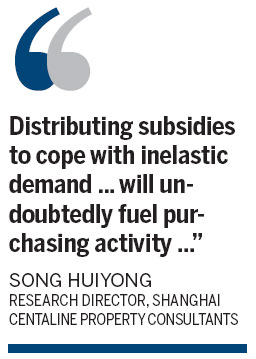Wuhu scraps week-old housing policy
|
Homebuyers at a real estate expo in Hangzhou, Zhejiang province. Premier Wen Jiabao said the government has two goals in tightening property regulations: to return prices to a reasonable level and to promote the sound development of the market. Huang Zongzhi / Xinhua News Agency |
SHANGHAI - A third-tier city in eastern Anhui province has called an abrupt halt to a housing policy that was announced only last week.
The move indicates the central government's determination to keep house-price inflation in check, analysts said.
On Thursday, Wuhu government in Anhui province published a notice on "further improving the living conditions of local residents". In an obvious break from the State's tightening policies, the notice said home purchasers would receive subsidies for the whole year if their newly bought homes were less than 90 square meters in area.
New homes with a gross floor area of between 70 sq m and 90 sq m would garner a subsidy of 50 yuan ($8) per sq m, while new homes less than or equal to 70 sq m would see a subsidy of 150 yuan per sq m.
Furthermore, under the policy, buyers would also be exempt from paying the deed tax for home purchases.
Although the local government denied that the policy was aimed at bailing out the ailing property market, the move triggered wild debate over whether the nation's tightening property policies will be reversed.
However, just three days later, the Wuhu government announced on its website that the policy will "be suspended because related supporting rules are being studied and improved".
"The sudden halting of Wuhu's new policy is related to bad timing, especially after Premier Wen Jiabao recently reiterated the importance of cooling the property market," said Hui Jianqiang, research director of Beijing Zhongfangyanxie Technology Service Ltd, which provides information about the real estate market.
The central government has two goals for the current round of property tightening. One is to return house prices to a reasonable level, and the other is to promote the long-term, steady and sound development of the property market, said the premier at a meeting of the State Council, China's cabinet, in early February.
"Wuhu's short-lived housing policy shows the central government's resolution to eliminate any possibility of pushing property prices higher," said Song Huiyong, a research director with Shanghai Centaline Property Consultants Ltd.

"Distributing subsidies to cope with inelastic demand in the local property market will undoubtedly fuel purchasing activity and indirectly jack up property prices," Song added.
Wuhu is not the first city to attempt to slacken the home-purchase restrictions. In October, Foshan, a third-tier city in Guangdong province, became the nation's first city to allow families to buy an additional dwelling, and to make houses that have been owned for more than five years tradable. However, that policy was scrapped just 12 hours after it was announced.
In 2009, China recorded land sales revenue of 1.59 trillion yuan, equal to 48.8 percent of local governments' revenue over the same period, according to a report in the China Securities Journal. The figure reached 2.7 trillion yuan in 2010, or 66.5 percent of the local governments' revenue as they became increasingly reliant on the revenue raised by land transactions, said the report.
However, the central government's tightening policies on the property market are leading to lower prices for most players.
Zhang Hongwei, research director at Shanghai Tongce Real Estate Co Ltd, expected that cash-strapped local governments may implement policies similar to those in Wuhu to loosen the restrictions on home purchases.
In one example, Zhongshan in Guangdong raised its price ceiling for tradable residential properties from 5,800 yuan per sq m to 6,590 yuan per sq m in late January, becoming the first city in China to do so in the Year of the Dragon, the Xinhua News Agency reported on Monday.
Of the 61 listed property companies tracked by Oriental Securities Co Ltd, only 10 saw their shares close higher on Monday. China Vanke Co Ltd, the nation's largest property developer by market value, dropped 1.91 percent to close at 7.70 yuan, and China Merchants Property Development Co Ltd fell 2.75 percent to close at 18.36 yuan.
China Daily
(China Daily 02/14/2012 page13)









